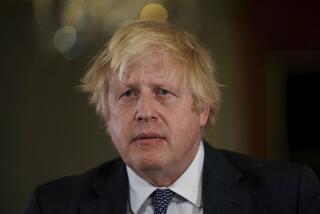Tempest at No. 10 Downing Street
- Share via
LONDON — A rift between British Prime Minister Tony Blair and Chancellor of the Exchequer Gordon Brown is threatening their partnership and creating new problems for the Labor Party as it prepares to seek an unprecedented third term in power.
Long the talk of members of Parliament, civil servants and the media, the battle between supporters of Blair and Brown erupted into fresh headlines this week after a book recounted in detail the depth of their purported rancor. It included a claim that Blair had betrayed Brown last year by deciding he would run for a third term as prime minister instead of turning over the party’s leadership to Brown.
On Monday, Labor lawmakers chastised Blair and Brown when they appeared before them at a private meeting in Parliament. There was “a real roasting” from backbenchers, said a BBC journalist. The parliamentarians told both sides to resolve their differences or risk ruin in the next general vote, expected to be held in May.
Blair promised that he and Brown would silence the gossip coming from their supporters. “I know from everyone here, in Cabinet and government, nothing is going to get in the way of a unified Labor Party,” the BBC quoted Blair as saying.
Conservative Party opponents, meanwhile, were looking on with glee, with Tory leader Michael Howard accusing Blair and Brown of acting “like schoolboys.” Labor has maintained a consistent lead over the Conservatives in polls, and Howard has been looking for a weakness to exploit.
Blair and Brown have been a formidable team for most of their political careers. They were among the primary architects of “New Labor,” sidelining radical leftists in the 1990s to make their party electable and ending the Conservatives’ 18-year grip on government.
Blair has been seen as the smooth-tongued leader from northern England, able to win over voters with his boyish energy and unwavering earnestness even in the face of strong popular opposition to the Iraq war.
Brown, a businesslike Scotsman, has operated largely behind the scenes, bringing foes and budgets into line and hammering out policies that appeal to the center of Britain’s electorate while not abandoning Labor’s traditional concern for the poor and working class.
In tandem, they brought their party victory in 1997 and later strengthened its hold on government with a huge parliamentary majority. They married a left of center social agenda with an emphasis on fiscal discipline. It has resulted in lower inflation, higher employment and more funds for public services.
But there has been constant talk of disharmony between the two on policy, personnel and political strategy. It has long been reported that Blair had made an agreement with Brown as early as 1994 to step aside.
Last week, reporters were rolling their eyes when Blair held his regular monthly Downing Street news conference at 10 a.m. Thursday, rather than at the normal noon hour, clashing with a long-planned speech by Brown in Edinburgh, Scotland. Blair said other obligations caused the time shift but refused to confirm that he would renominate Brown as chancellor if he wins a third term.
That same day, it was announced that Blair intended to speak this year at the annual economic conference in Davos, Switzerland, displacing Brown.
Robert Peston’s new book, “Brown’s Britain,” has only inflamed the row. Excerpts in the Sunday Telegraph quoted Brown supporters who accused Blair of reneging on a firm promise a year ago to step down and hand over the reins to Brown.
The newspaper banner-headlined a purported remark by Brown to Blair: “There is nothing that you could say to me now that I could ever believe.” It suggested the split between the two was irreconcilable, causing Brown to hurry to the BBC on a Sunday afternoon to say that things were not that bad.
Concerned about the damage to the party’s election prospects, Brown spoke of a “fundamental unity” inside the party and said he still had a “shared purpose” with Blair.
On Monday, Defense Minister Geoff Hoon said it wasn’t the feud that was intensifying but only “the reporting about this. This is not a new story. It’s been around for a long time ... and we’re going through one of those bouts of media speculation.”
But Labor backbenchers, who do not want to face the voters with a war raging at the top of their party, were more open in their criticism.
“Ordinary party members and MPs would like some common sense to break out at the very top and at the very least to bury the hatchet, and not into the skull,” Dianne Abbott, a parliamentarian from Hackney in London told Sky television.
In an apparent warning to Brown’s supporters, Health Minister John Reid said the party would not forgive anyone who jeopardized a third term, the Press Association reported. “These reports are damaging, and those who cooperate or inspire these books, in my view, have to know that,” Reid said.
The conservative Daily Mail, meanwhile, was reveling in the discord. “For a long time it has been clear that the prime minister cannot even be honest with the man who was once his closest ally and is Labor’s greatest chancellor,” the tabloid commented.
Janet Stobart of The Times’ London Bureau contributed to this report.
More to Read
Sign up for Essential California
The most important California stories and recommendations in your inbox every morning.
You may occasionally receive promotional content from the Los Angeles Times.













